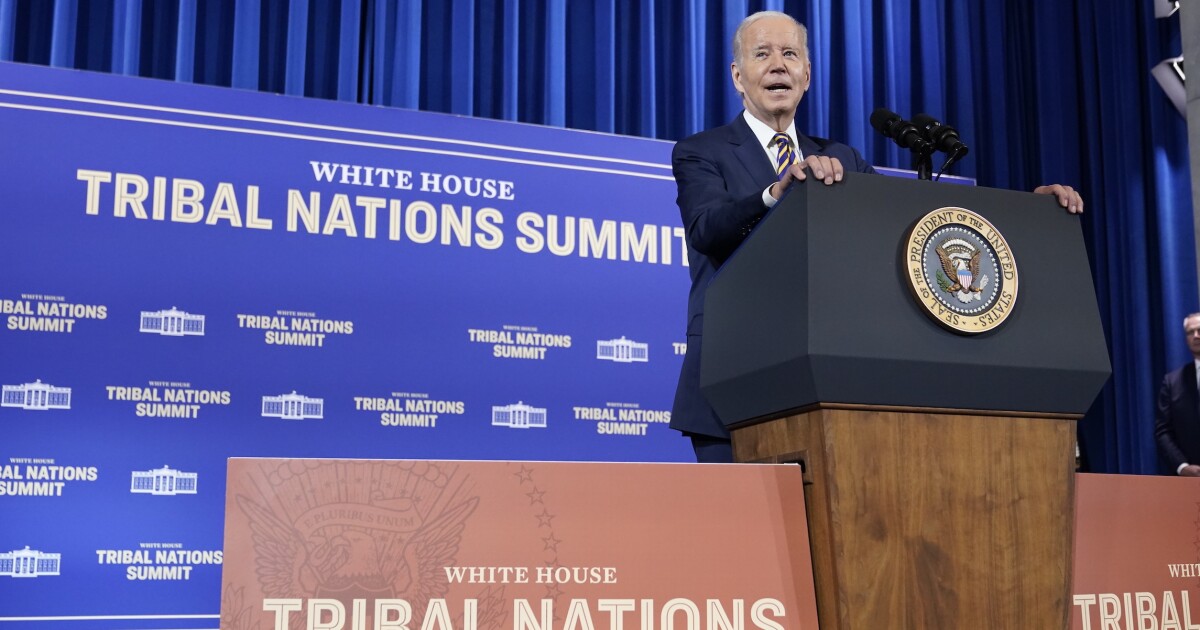

President Joe Biden is touting his support for tribal nations even as some of them are suing his administration.
Biden hosted the third annual White House Tribal Nations Summit on Wednesday, speaking at the Interior Department in Washington about his commitment to helping native communities.
BIDEN CONCEDES HE IS ‘NOT SURE’ HE WOULD BE SEEKING REELECTION IF IT WASN’T FOR TRUMP
“On my watch, the federal government has made record investments to tribal nations,” Biden said. “These transformational investments are going to help all Americans thrive. We know the federal dollars are vital to your communities in order to be able to thrive.”
Biden pointed out that his predecessor, former president Donald Trump, did not host the summits during his time in office, saying, “I’m proud to relaunch this annual summit after years of neglect by my predecessors.”
Yet the situation is more complicated, as some of the country’s 574 federally recognized tribes have public gripes with the Biden administration, and some have even filed lawsuits.
At least three tribes in Montana and South Dakota, for example, have sued the administration over police funding, which is provided to tribes by the federal government under a series of 19th-century treaties. In one case, there are only 33 officers and eight criminal investigators responsible for more than 100,000 emergency calls a year on a reservation the size of Connecticut.
The government has filed a motion to dismiss at least one of the suits, arguing the treaties do not spell out how many officers the U.S. must provide a given tribe.
But disputes have also emerged in other areas. The Biden administration has banned oil, gas, and mineral leasing within 10 miles of the Chaco Culture National Historical Park in New Mexico. While the administration pitted the move as a way to protect tribal communities, the Navajo Nation is considering a lawsuit because the ban negatively affects its economy.
Rep. Harriet Hageman (R-WY), who chairs a House panel on Indian affairs, said the ban is a cruel decision on Biden’s part and one that was made without consulting tribal leaders.
“This is just one of many examples where this president is destroying something while claiming to help,” Hageman said. “And even worse, it was a decision for Congress, not Joe Biden, to make. This ban creates economic hardship that will take money away from much-needed education, medical, and infrastructure projects.”
Yet another problem has cropped up in Oregon, where the administration may allow a tribe to build a second casino far from its own territory, which has infuriated other tribes and some Democrats in the region.
“The Interior Department is weighing giving the Coquille Tribe of North Bend, Oregon, the opportunity to establish a second casino on lands it purchased in Medford, Oregon,” said Stephen Dow Beckham, Lewis & Clark College history professor emeritus. “If [Assistant Secretary of the Interior for Indian Affairs] Brian Newland rules that the Coquille land purchase qualifies for gaming, it opens Pandora’s Box in Oregon for all the tribes to scramble to find new casino sites to gain increased market share.”
That decision could risk bankrupting nearby, smaller casinos operated by other tribes, Beckham said, and is not supported by established law. However, he also praised the Biden administration generally for consulting and working fairly with tribes.
Newland introduced Biden before his speech, which also included the announcement that a tribal nations lacrosse team may be allowed to compete under its own flag in the Olympics, in part because native peoples invented the sport.
Overall, relations between tribes and the U.S. government have improved considerably since President Richard Nixon orchestrated an overhaul during the early 1970s, argues Robert Miller, an Arizona State University law professor and citizen of the Eastern Shawnee Tribe in Oklahoma.
Miller says the lawsuits are complicated affairs that reflect problems dating back far beyond the Biden administration.
“No government wants to be sued, right?” Miller said. “They want to be patted on the back because they’re doing a great job. But this isn’t an attack on the Biden administration. Nobody’s claiming they changed rules or did something that has led to this problem. These are multi-generational problems under every presidential administration.”
CLICK HERE TO READ MORE FROM THE WASHINGTON EXAMINER
Still, the Biden White House says it aims to do more than previous administrations, touting the fact that Interior Secretary Deb Haaland is the first indigenous Cabinet secretary and announcing a spate of executive actions ahead of Wednesday’s speech including actions to improve healthcare, implement treaty rights training for federal employees, and moves to support a “clean energy transition” for tribal citizens.
“We know you know best how to invest, not us,” Biden said. “You know what your communities need, and that’s what self-determination means. That’s why today I’m signing an executive order to reform the federal funding system for tribes, cutting out red tape so you can deliver for your community faster and better.”





